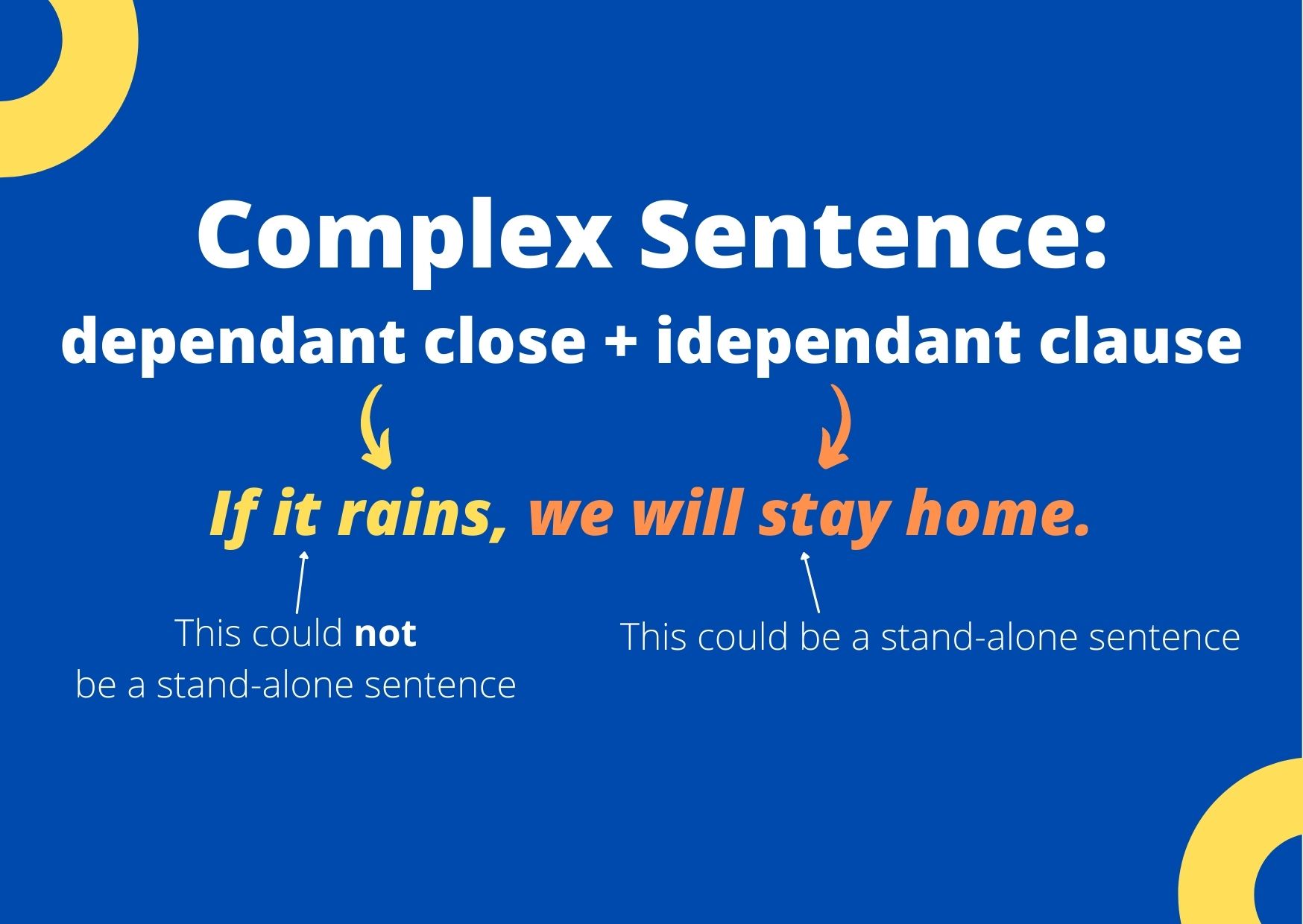A complex sentence is a sentence that includes one independent clause and at least one dependent clause. They work best when you need to provide more information to modify or explain your sentence’s main point. Complex sentences are simple to spot as they often use subordinating conjunctions like because, since, or until to adjoin clauses.
But why are they called “complex?” A complex sentence is not the same as a simple sentence, but shares some similarities with compound sentences. Does that sound complex? Don’t worry; they are easy to use once you understand how they work, which we explain completely below. We’ll talk about simple vs. complex sentences, independent vs. dependent clauses, and give you plenty of examples.
What is a complex sentence?
Complex sentences are one of four types of sentences based on composition (simple, complex, compound, and compound-complex). Their distinction is that they include a dependent clause.
Dependent clauses, aka subordinate clauses, are clauses that can’t stand alone as a complete sentence. With no independent clause, a dependent clause is just a sentence fragment.
Wrong: When I grow up
Correct: When I grow up, I will use complete sentences correctly.
One of the most used types of complex sentences are conditional sentences, which discuss imaginary circumstances, often using an if-then structure. In a conditional sentence, one clause is true only if both of the clauses are true.
If it rains, the graduation will be postponed.

Independent vs. dependent clauses: What’s the difference?
The key to using a complex sentence is understanding the difference between independent and dependent clauses. Essentially, independent clauses are complete sentences by themselves, but dependent clauses are not. Both clauses, however, contain a subject and a verb, so why is one a complete sentence and the other isn’t?
The easy answer is that dependent clauses always start with subordinating conjunctions. In a way, these subordinating conjunctions change independent clauses into dependent ones.
You’re probably familiar with some common subordinating conjunctions, like because, since, if, until, when, even though, in case, while, now that, and some uses of the prepositions before and after. There are quite a few less frequent subordinating conjunctions, so we recommend studying the list above until you can pick them out them on your own.
With a subordinating conjunction, a clause will become a description of another clause. This means, dependent clauses change the meaning of independent clauses. Think about this example of an independent clause:
You cannot eat the cake.
That’s not fair! Alone, this independent clause means that can never eat cake. Now, we’ll add a dependent clause to make a complex sentence that clarifies things further:
You cannot eat the cake until it cools.
Do you see how the dependent clause changes the meaning of the main point?
Simple versus complex sentences
The contrast between simple and complex sentences is a little easier to explain. Simple sentences are any sentence that only has one independent clause. Any sentence with multiple clauses cannot be simple sentences.
Interestingly, you can sometimes merge two simple sentences to create one complex sentence, just as long as you add a subordinate conjunction.
Simple sentences:
Heather ate a giant cookie. She got a stomach ache.
Complex sentence:
After Heather ate a giant cookie, she got a stomach ache.
How to make a complex sentence
Even though conditional sentences get complicated, complex sentences in general have mostly simple grammar rules. If you’re using the right subordinate conjunction, you only need to worry about commas in complex sentences.
Whether or not to use a comma will depend on which clause comes first:
- If the dependent clause comes first, a comma goes just before the independent clause.
- If the independent clause is first, no comma is required.
Here are a couple of complex sentence examples to demonstrate:
When I got home from work, where were you?
Where you when I got home from work?
Complex sentence examples
Here’s some examples from famous writers to help you better understand how these sentences work. We have underlined the subordinate conjunction in each.
“Start writing, no matter what. The water does not flow until the faucet is turned on.”
– Louis L’Amour
“A bird doesn’t sing because it has an answer; it sings because it has a song.”
– Maya Angelou
“And now that you don’t have to be perfect, you can be good.” —John Steinbeck
“What difference does it make if the thing you’re scared of is real or not?”— Toni Morrison
“Keep calm when things don’t go according to your expectations! Beautiful things always meet friction!” ―Ernest Agyemang Yeboah
Tips for writing a complex sentence
Once you understand subordinate conjunctions and dependent clauses, complex sentences don’t seem too complex after all. You can even improve on them using the same exact tips on how to write better sentences.
If you still need help with your writing, you can always download a grammar app to ensure your writing is correct. Some apps offer features that not only point out mistakes, but also suggest better word choices and recommend phrasing to improve clarity. Try one out and see how your writing improves.
—
Want to sharpen your business writing skills? Discover our acclaimed online courses at syntaxtraining.com






